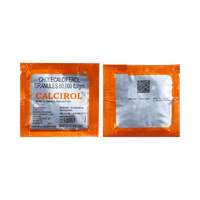Rs.7.50for 1 vial(s) (1 ml Injection each)
food interaction for B Colex
alcohol interaction for B Colex
pregnancy interaction for B Colex
lactation interaction for B Colex
food
alcohol
pregnancy
lactation
No interaction found/established
Alcohol should be used with caution while taking B Colex Injection.
CAUTION
The safety of B Colex Injection during pregnancy has not been established. There are no adequate and well-controlled studies in pregnant women, and animal data on reproductive toxicity are insufficient. Your doctor will weigh the benefits and any potential risks before prescribing.
CONSULT YOUR DOCTOR
Available human data suggest that the drug does not pass into breast milk in clinically significant amounts and is unlikely to harm the infant.
SAFE IF PRESCRIBED
SALT INFORMATION FOR B Colex
Folic Acid(0.7mcg)
Uses
Folic Acid is used in the treatment of anemia due to chronic kidney disease, iron deficiency anemia and anemia due to folic acid deficiency.
How it works
Folic Acid is a form of vitamin B. It plays a vital role in the formation of red blood cells, which carry oxygen throughout the body. It is also essential in pregnancy due to its role in the development of the unborn baby's brain and spinal cord.
Common side effects
No common side effects seen
Niacinamide(12mg)
Uses
Niacinamide is used in the treatment of nutritional deficiencies.
How it works
Niacinamide provides essential nutrients.
Common side effects
Nausea, Portal vein fibrosis, Blockade of portal blood vessels, Dry hair, Headache, Heartburn, Hepatobiliary disorder, Liver toxicity, Sore throat, Stiffness of face, Disorientation (alteration of mental status), Fatigue
SUBSTITUTES FOR B Colex
No substitutes foundExpert advice FOR B Colex
- Folic Acid is used for the treatment of folic acid deficiency.
- It is also taken before and during pregnancy to decrease the risk of defects in the neural tube, which forms the spinal cord in the baby.
- Inform your doctor if you have a history of seizures as you may need a higher dose of the seizure medicines than what you normally take.
Frequently asked questions FOR B Colex
Folic Acid
Q. Is it ok to take Folic Acid when not pregnant?
Usually, folic acid requirements are met from the diet and therefore additional supplements are not required. In general, Folic Acid is recommended only when you have a deficiency of folic acid. However, Folic Acid is advised to women who are pregnant and who want to conceive. The medicine should be taken at least 4 weeks before pregnancy and should continue its use up to 3 months of pregnancy. Consult your doctor if not sure.
Q. Can Folic Acid cause weight gain?
Animal studies on Folic Acid suggest that taking the medicine in excess along with a high-fat diet may lead to weight gain and fat accumulation. But this weight gain was not evident when taken along with a normal or low-fat diet, even with excess Folic Acid. In humans, similar studies have not been conducted and therefore knowledge regarding weight gain is lacking. Therefore, if you are on Folic Acid eat a low-fat meal to be on the safer side.
Q. How long does Folic Acid take to work?
Folic Acid usually starts working within a few hours of taking it. If you are taking it for iron deficiency anemia, you may start feeling better after a few weeks of taking it. In case you are taking it during pregnancy, you may not notice any difference but this does not mean that the dose is not working. Continue taking Folic Acid for the duration recommended by your doctor.
Niacinamide
Q. What is Niacinamide? What is it used for?
Niacinamide is a medicine used in the treatment of conditions caused due to low levels of vitamin B3 in the body. It reduces the cholesterol levels to normal. It also helps in the treatment of symptoms like loss of appetite, weakness, diarrhea, skin inflammation and mental changes.
Q. Is Niacinamide effective?
Niacinamide is effective if used in the dose and duration advised by your doctor. Do not stop taking it even if you see improvement in your condition. If you stop using Niacinamide too early, the symptoms may return or worsen.
Q. How should Niacinamide be taken?
Niacinamide should be taken in the dose and duration advised by your doctor. It can be taken with or without food. However, it is advised to take it at the same time each day to avoid the chances of missing a dose.






















